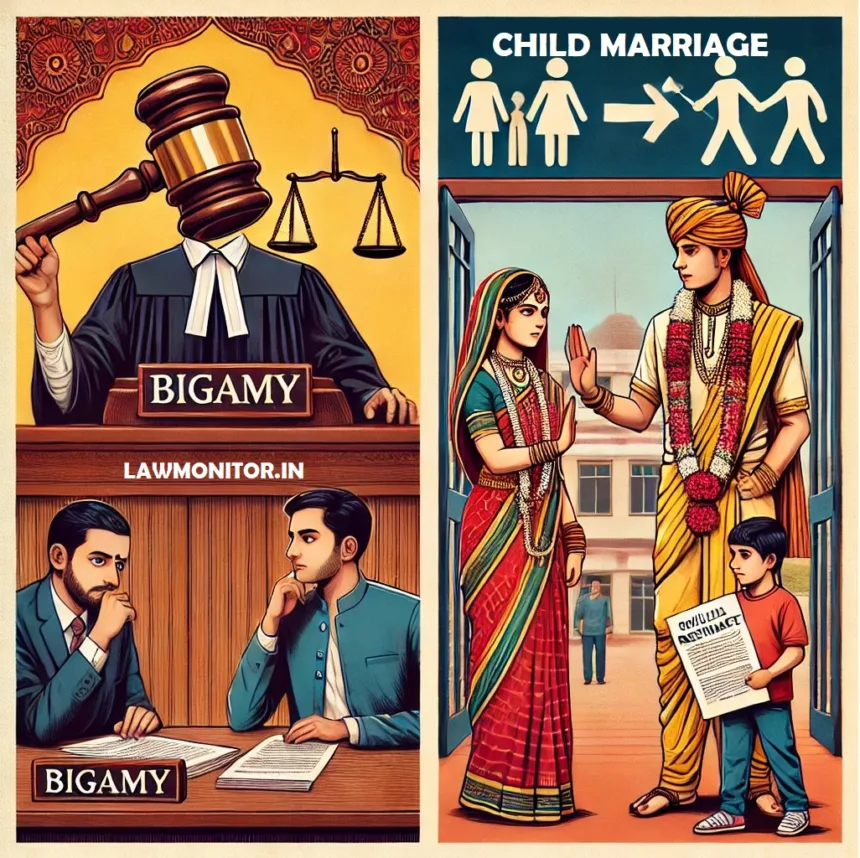Sections 17 and Section 18 of the Hindu Marriage Act,1955 aims to prevent practices such as bigamy and child marriage while ensuring that certain conditions for a valid marriage are upheld.
Section 17: Punishment of Bigamy
Any marriage between two Hindus solemnized after the commencement of this Act is void if at the date of such marriage either party had a husband or wife living; and the provisions of sections 494 and 495 of the Indian Penal Code (45 of 1860), shall apply accordingly.- HMA,1955 Section 15.
Any marriage solemnized between two Hindus after the commencement of the Act is void if either party has a living spouse (husband or wife) at the time of the marriage.
The marriage is not recognized under law and holds no legal validity.
Applicability of IPC Sections 494 and 495:
- Section 494, IPC: Punishes bigamy, i.e., marrying again during the lifetime of a living spouse. Punishment includes imprisonment (up to 7 years) or a fine, or both. (in BNS Section 82A)
- Section 495, IPC: Deals with cases where the second marriage is performed by concealing the fact of the first marriage. Punishment is more severe, with imprisonment (up to 10 years) and a fine.(in BNS Section 82B)
Objective:
- To deter the practice of bigamy and ensure adherence to monogamy as a key principle of Hindu marriage.
- To promote legal and social equality in marriage relationships.
Key Points to Note:
Bigamy under this section does not merely make the marriage void but also attracts criminal liability under the Indian Penal Code. The section applies only to Hindus as defined under Section 2 of the Hindu Marriage Act.
Section 18: Punishment for Contravention of Certain Other Conditions for Hindu Marriage
This section penalizes violations of specific conditions for a valid Hindu marriage as laid out in Section 5. The punishable contraventions are:
Clause (iii) of Section 5:
Prohibits child marriage by setting the minimum age for marriage: 21 years for the groom and 18 years for the bride
Punishment for violation:
- Rigorous imprisonment (up to 2 years), or
- Fine (up to ₹1,00,000), or
- Both.
Clause (iv) of Section 5:
Prohibits marriages within the degrees of prohibited relationships unless allowed by custom or tradition.
Punishment for violation:
- Simple imprisonment (up to 1 month), or
- Fine (up to ₹1,000), or
- Both.
Clause (v) of Section 5:
Prohibits marriages between sapindas (persons within close blood relationships) unless permitted by custom or tradition.
Punishment for violation:
- Simple imprisonment (up to 1 month), or
- Fine (up to ₹1,000), or
- Both.
| Violation | Relevant Section | Punishment |
|---|---|---|
| Bigamy (marrying again during the lifetime of a living spouse) | Section 17 + IPC Sections 494/495 | – Imprisonment: Up to 7 years (Section 494) or up to 10 years (Section 495 if concealment is involved) – Fine: Amount not specified, or both |
| Child Marriage (marrying below the prescribed age: 21 for males, 18 for females) | Section 18(a) | – Rigorous imprisonment: Up to 2 years – Fine: Up to ₹1,00,000 – Or both |
| Marriage within Prohibited Degrees (e.g., close blood relationships without custom permitting) | Section 18(b) (Clause (iv) of Section 5) | – Simple imprisonment: Up to 1 month – Fine: Up to ₹1,000 – Or both |
| Marriage Between Sapindas (persons within close ancestral relations, unless permitted by custom) | Section 18(b) (Clause (v) of Section 5) | – Simple imprisonment: Up to 1 month – Fine: Up to ₹1,000 – Or both |
Objective
To ensure compliance with the prerequisites of a valid Hindu marriage.
To discourage practices such as child marriage, and marriages within prohibited degrees or sapinda relationships, which may harm societal and familial harmony.
Key Points to Note
The section emphasizes personal accountability, making individuals responsible for adhering to these conditions.
While violations of clauses (iv) and (v) are treated with less severity, the prohibition of child marriage under clause (iii) carries a significantly higher penalty to align with the efforts to eradicate this social evil.



